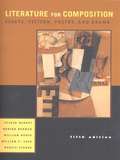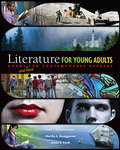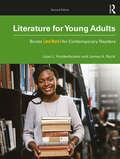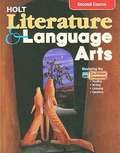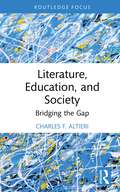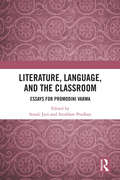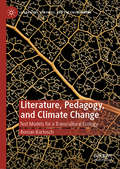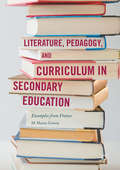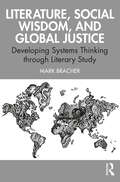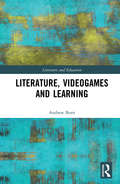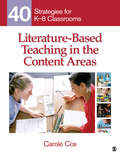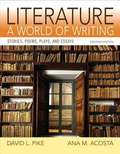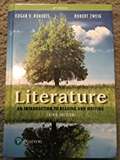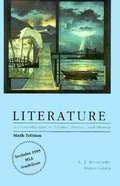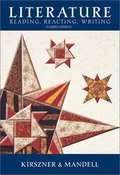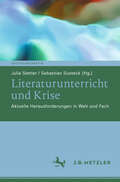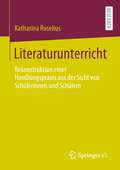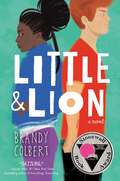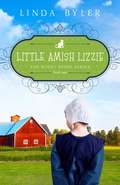- Table View
- List View
Literature for Composition: Essays, Fiction, Poetry and Drama
by Sylvan Barnet Morton Berman William BurtonLiterature for Composition is a versatile anthology which has both diverse selections and excellent coverage of writing instruction. The book begins with six chapters on the reading and writing process, followed by a section on literary works and forms, a section on argument, and a thematic anthology. The new edition features updated casebooks on prominent writers as well as a new mini-casebook on The Titanic.
Literature for Young Adults: Books (and More) for Contemporary Readers
by Brueggeman A. Martha James Rycik Joan L. KnickerbockerYoung adults are actively looking for anything that connects them with the changes happening in their lives, and the books discussed throughout Literature for Young Adults have the potential to make that connection and motivate them to read. It explores a great variety of works, genres, and formats, but it places special emphasis on contemporary works whose nontraditional themes, protagonists, and literary conventions make them well suited to young adult readers. It also looks at the ways in which contemporary readers access and share the works they're reading, and it shows teachers ways to incorporate nontraditional ways of accessing and sharing books throughout their literature programs. In addition to traditional genre chapters, Literature for Young Adults includes chapters on literary nonfiction; poetry, short stories, and drama; cover art, picture books, illustrated literature, and graphic novels; and film. It recognizes that, while films can be used to complement print literature, they are also a literacy format in their own right-and one that young adults are particularly familiar and comfortable with. The book's discussion of literary language--including traditional elements as well as metafictive terms--enables readers to share in a literary conversation with their students (and others) when communicating about books. It will help readers teach young adults the language they need to articulate their responses to the books they are reading.
Literature for Young Adults: Books (and More) for Contemporary Readers
by Joan L. Knickerbocker James A. RycikNow in its second edition, this book explores a great variety of genres and formats of young adult literature while placing special emphasis on contemporary works with nontraditional themes, protagonists, and literary conventions that are well suited to young adult readers. It looks at the ways in which contemporary readers can access literature and share the works they're reading, and it shows teachers the resources that are available, especially online, for choosing and using good literature in the classroom and for recommending books for their students’ personal reading. In addition to traditional genre chapters, this book includes chapters on literary nonfiction; poetry, short stories, and drama; and film. Graphic novels, diversity issues, and uses of technology are also included throughout the text. The book's discussion of literary language—including traditional elements as well as metafictive terms—enables readers to share in a literary conversation with their peers (and others) when communicating about books. This book is an essential resource for preservice educators to help young adults understand and appreciate the excellent literature that is available to them. New to the second edition: New popular authors, books, and movies with a greater focus on diversity of literature Updated coverage of new trends, such as metafiction, a renewed focus on nonfiction, and retellings of canonical works Increased attention to graphic novels and multimodal texts throughout the book eResources with downloadable materials, including book lists, awards lists, and Focus Questions
Literature in the Digital Age
by Adam HammondLiterature in a Digital Age: An Introduction guides readers through the most salient theoretical, interpretive, and creative possibilities opened up by the shift to digital literary forms such as e-books, digital archives, and electronic literature. While Digital Humanities (DH) has been hailed as the 'next big thing' in literary studies, many students and scholars remain perplexed as to what a DH approach to literature entails, and skeptical observers continue to see literature and the digital world as fundamentally incompatible. In its argument that digital and traditional scholarship should be placed in dialogue with each other, this book contextualizes the advent of the digital in literary theory, explores the new questions readers can ask of texts when they become digitized, and investigates the challenges that fresh forms of born-digital fiction pose to existing models of literary analysis.
Literature of Language Arts: Second Course (California Edition)
by Holt Rinehart WinstonThis is a book with a big idea--that you are going to learn a lot about your language. This book came together because of the efforts of lots of people--writers, editors, artists, teachers, and even students like you. The chapters in Part 1 begin with an essay that explains the key standards you'll be mastering in the chapter. Then you'll read several literary selections. Following almost every literary selection, you will find some interesting readings, called informational texts. These might be newspaper or magazine articles, Web pages, instructional manuals, interviews, signs, maps, or other documents. All of these informational texts relate to the piece of literature. For example, after the story "In Trouble," about Gary Paulsen's experiences with sled dogs, you'll find an informational article about some of the breeds of dogs used to pull sleds. Along the way you'll find a lot of help in acquiring new words.
Literature, Education, and Society: Bridging the Gap (Routledge Focus on Literature)
by Charles F. AltieriIn today’s classrooms, educators specializing in literature and the arts have found themselves facing an escalating crisis. Most obviously, they encounter serious budget cuts, largely because students tend in increasing numbers to prefer majoring in disciplines that provide clear, practical knowledge and the promise of relatively lucrative careers. These educators have addressed the crisis by stressing how the arts can also provide valuable forms of knowledge by testing moral values and by developing the skills of critical thinking required to understand the cost of apparently perennial social problems. Literature, Education, and Society offers a fresh strategy by focusing not on knowledge but on how literature and the arts provide distinctive domains of experience that stress significant values not typically provided by other disciplines. Practical disciplines tend to treat experiences as instances for which we learn to provide interpretive generalizations, making knowledge possible and helping us establish concrete programs for acting in accord with what we come to know. But the arts do not encourage generalizing from particulars. Instead they emphasize how to appreciate the particulars for qualities like sensitivity, intensity, and the capacity to solicit empathy. In order to dramatize this crucial difference, this book distinguishes sharply between a focus on "experience of" what solicits knowledge and a focus on "experience as" which encourages careful attention to what can be embedded in particular experiences. Then the book characterizes the making of art as an act of doubling. where the making fashions some aspect of experience and invites self-conscious participation in the intensity provided by the particular work. After exploring several aspects of doubling, the book turns to the vexed question of ethics, arguing that while this theory cannot persuade us that the arts improve behavior, its stress on art’s purposive structuring of experience can affect how people construct values, something essential to education itself.
Literature, Language, and the Classroom: Essays for Promodini Varma
by Sonali Jain; Anubhav PradhanThis book is a Festschrift dedicated to Promodini Varma, a meticulous scholar, teacher, and administrator of extraordinary rigour, grit, and perception. It presents reflections on researching and teaching English literatures and languages in India. It concerns itself broadly with literary modernism and English language teaching and classroom pedagogy, some of the core concerns of the literary fraternity today. The volume examines how the literary and cultural manifestations of modernity have pervasively informed not just much of our disciplinary framework but many of the key issues—decolonisation, globalisation, development—our society grapples with. With essays on William Butler Yeats, Arthur Conan Doyle, E.M. Forster, D.H. Lawrence, and Rudyard Kipling, the volume presents fresh insights on familiar canonical ground. It discusses ELT and classroom pedagogy and provides grounded appraisals of teaching and translating for multilingual classroom audiences given the demands of employability and the hierarchical dynamics of educational institutions. An interview on feminist pedagogy and theatre and an essay on urban nostalgia and redevelopment act as pertinent outliers, reflecting the ongoing transition to more multi-sited and interdisciplinary research and praxis. An engaging read on some of the most pressing concerns in the field, this book will be of great interest to scholars and researchers of literature and literary criticism, English language studies, and education.
Literature, Pedagogy, and Climate Change: Text Models for a Transcultural Ecology (Literatures, Cultures, and the Environment)
by Roman BartoschLiterature, Pedagogy, and Climate Change: Text Models for a Transcultural Ecology asks two questions: How do we read (in) the Anthropocene? And what can reading teach us? To answer these questions, the book develops a concept of transcultural ecology that understands fiction and interpretation as text models that help address the various and incommensurable scales inherent to climate change. Focussing on text composition, reception, storyworlds, and narrative framing in world literature and elsewhere, each chapter elaborates on central educational objectives through the close reading of texts by Chimamanda Ngozi Adichie, Teju Cole and J.M. Coetzee as well as films, picture books and new digital media and their aesthetic affordances. At the end of each chapter, these objectives are summarised in sections on the ‘general implications for studying and teaching’ (GIST) and together offer a new concept of transcultural competence in conversation with current debates in literature pedagogy and educational philosophy.
Literature, Pedagogy, and Curriculum in Secondary Education
by M. Martin GuineyThis book argues for the importance of literature studies using the historical debate between the disinterested disciplines ("art for art's sake") and utilitarian or productive disciplines. Foregoing the traditional argument that literature is a unique spiritual resource, as well as the utilitarian thought that literary pedagogy promotes skills that are relevant to a post-industrial economy, Guiney suggests that literary pedagogy must enable mutual access between the classroom and the outside world. It must recognize the need for every human being to become a conscious producer of culture rather than a consumer, through an active process of literary reading and writing. Using the history of French curricular reforms as a case study for his analysis, Guiney provides a contextualized redefinition of literature's social value.
Literature, Social Wisdom, and Global Justice: Developing Systems Thinking through Literary Study
by Mark BracherThis book responds to the pressing and increasingly recognized need to cultivate social wisdom for addressing major problems confronting humanity. Connecting literary studies with some of the biggest questions confronted by researchers and students today, the book provides a practical approach to thinking through, and potentially solving, global problems such as poverty, inequality, crime, war, racism, classism, environmental decline, and climate change. Bracher argues that solving such problems requires “systems thinking” and that literary study is an excellent way to develop the four key cognitive functions of which systems thinking is composed, which are causal analysis, prospection/strategic planning, social cognition, and metacognition. Drawing on evidence-based learning theory, as well as the latest research on systems thinking and its four cognitive functions, the book provides a comprehensive and detailed explanation of how these advanced thinking skills can be developed through literary study, illustrating the process with numerous examples from major works of literature. In explaining the nature and importance of these thinking skills and the ability of literary study to develop them, this book will be of value to literature teachers and students from introductory to advanced levels, and to anyone looking to develop better problem-solving and decision-making skills.
Literature, Videogames and Learning (Literature and Education)
by Andrew BurnThis innovative book explores links between literature and videogames, and how designing and playing games can transform our understanding of literature. It shows how studying literature through the lens of videogames can provide new insights into narrative and creative engagement with the text. The book sets out theories of narrative aesthetics and multimodality in literature and videogames, alongside models of literacy needed for such cultural and creative engagement. It goes on to examine game adaptations of children’s literature; and a series of videogames made by students based on Beowulf and Macbeth. In each case, the book considers ways in which the original text has been transformed by the process of game design, and what fresh light this casts on the literary narrative. It also considers what kind of learning, creative production, and cultural engagement is apparent in the game designs and emphasises the importance of treating games as a narrative medium in their own right. With a unique approach to the aesthetics of narrative in literature and videogames, the book will be of great interest to researchers, academics, and post-graduate students in the fields of literature, pedagogy, and game studies.
Literature-Based Teaching in the Content Areas: 40 Strategies for K-8 Classrooms
by Dr Carole A. CoxGrounded in theory and best-practices research, this practical text provides teachers with 40 strategies for using fiction and non-fiction trade books to teach in five key content areas: language arts and reading, social studies, mathematics, science, and the arts. Each strategy provides everything a teacher needs to get started: a classroom example that models the strategy, a research-based rationale, relevant content standards, suggested books, reader-response questions and prompts, assessment ideas, examples of how to adapt the strategy for different grade levels (K–2, 3–5, and 6–8), and ideas for differentiating instruction for English language learners and struggling students. Throughout the book, student work samples and classroom vignettes bring the content to life.
Literature: A World Of Writing Stories, Poems, Plays, Essays
by David L. Pike Ana M. AcostaAn extensive writing handbook shows students how to read critically and guides them through the process of writing arguments using dynamic visual tools to convey key concepts. Key concepts are presented visually using idea maps, fill-in boxes, and annotations that enable students to grasp main ideas more effectively.
Literature: An Introduction To Reading And Writing
by Edgar V. Roberts Robert ZweigLiterature: An Introduction to Reading and Writing, Compact Edition is founded on the principles of writing about literature. It is not an afterthought and it is not treated as a separate chapter or appendix; but rather, it is the carefully integrated philosophy of Professor Roberts' approach to teaching literature and composition. Complete coverage of writing about each element and a total of 28 MLA-format student essays with accompanying commentary ensure student comprehension of writing about literature and therefore, produce better student papers.
Literature: An Introduction to Fiction, Poetry and Drama
by X. J. Kennedy Dana GioiaLiterature, in the widest sense, is just about anything written. It is even what you receive in the mail if you send for free information about a weight-reducing plan or a motorcycle. In the sense that matters to us in this book, literature is a kind of art, usually written, which offers pleasure and illumination. We say it is usually written, for we have an oral literature, too. Few would deny the name of literature to "Bonny Barbara Allan" and other immortal folk ballads, though they were not set down in writing until centuries after they were originated.
Literature: An Introduction to Reading and Writing (7th Edition)
by Edgar V. Roberts Henry E. JacobsThe seventh edition of Roberts and Jacobs, "Literature: An Introduction to Reading and Writing," offers the most comprehensive and integrated coverage of writing about literature and contains more student essays than any other text. WRITING ABOUT LITERATURE: Integrated coverage of writing about each of the elements in EVERY chapter STUDENT ESSAYS: 34 student essays with at least one per chapter and includes a fully documented research paper RESEARCH: Extensive coverage of the research process, documentation, and strategies within the text, as well as access to Research Navigator, a new resource providing extensive help on the research process and three databases of relevant and reliable source material at www.researchnavig4tor.com. ART: The seventh edition also includes three NEW inserts of FOUR-COLOR FINE ART! Get your students engaged with literature through www.prenhall.com/roberts with interactive activities, researched author links, videos of author interviews (Stephen Dunn, Rita Dove, Alberto Rios), additional contextual information, and much more.
Literature: An Introduction to Reading and Writing AP 4th Edition
by Edgar V. Roberts Darlene Stock StotlerDedicated to the interlocking processes of reading and writing, this book contains carefully chosen literary selections, and each chapter contains detailed information on and sample essays for writing about literature.
Literature: Reading, Reacting, Writing (Fourth Edition)
by Laurie G. Kirszner Stephen R. MandellA resource material for teaching students how to write about literature.
Literature: Structure, Sound And Sense (6th Edition)
by Thomas R. Arp Laurence PerrineLiterature: Structure, Sound, and Sense is intended for the student who is beginning a serious study of imaginative literature. It provides a comprehensive introduction to the principal forms of fiction, poetry, and drama.
Literature: Timeless Voices, Timeless Themes (Silver Level)
by Richard Lederer Sharon Sorensen Heidi Hayes JacobsThis book is talked about laughter, tears, failure, and triumph are part of every life. These experiences are part of growing up and part of growing older. Along with the characters and authors in this unit, experience what it's like to travel on the road of life--finding adventure and friendship, and gaining insights about life along the way.
Literaturunterricht und Krise: Aktuelle Herausforderungen in Welt und Fach (Deutschdidaktik)
by Julia Stetter Sebastian SusteckDer Literaturunterricht steht unter Druck. Bildungspolitisch ungeliebt und didaktisch zunehmend ratlos betrachtet, lässt Literatur sich nur schwer in Kompetenzraster integrieren und steht zudem im Verdacht, zu den existenziellen Problemen der Gegenwart zu wenig zu sagen zu haben. Der Band öffnet neue Perspektiven auf den heutigen Literaturunterricht, der in multiplen Krisen gefangen scheint und im Kreuzfeuer von Entwicklungen steht, die allgemein mit Problemen deutscher Schulen assoziiert werden. Die Beiträge betonen dagegen die Bedeutung der Literatur für den Unterricht sowie die Rolle des Literaturunterrichts in der Reaktion auf die Krisen der Gegenwart.
Literaturunterricht: Rekonstruktion einer Handlungspraxis aus der Sicht von Schülerinnen und Schülern
by Katharina RoseliusZiel der vorliegenden Studie ist es, im Rahmen der Institution Schule Möglichkeiten literarischer Bildung zu eruieren. Die Studie geht dabei schonungslos mit ihren eigenen Voraussetzungen um, entlarvt den Wunsch der Autorin nach eben diesen bildenden Momenten im Literaturunterricht. Gerade die empirisch evidente Verhinderung von Bildung im Literaturunterricht wird am Ende zum Horizont, vor dem sich literarische Bildung als Möglichkeit, als Nische, abzeichnet. Das Besondere aber jenseits dieser Möglichkeit ist der sezierende Blick, mit dem die Paradoxien der sozialen Praxis „Literaturunterricht“ freigelegt werden. Eine wesentliche, nicht zu überschätzende Leistung für die literaturdidaktische Forschung besteht im Wechsel der Beobachtungsform und der dadurch bedingten alternativen Gegenstandskonstitution von Text, Subjekt und Lektüre. Diese Verschiebung des Blickwinkels fordert den momentan dominierenden Kompetenzdiskurs mit seinem essentialistischen Text- und Lektürekonzept zur Selbstreflexion heraus.
Little & Lion
by Brandy ColbertA stunning novel on love, loss, identity, and redemption, from Publishers Weekly Flying Start author Brandy Colbert. When Suzette comes home to Los Angeles from her boarding school in New England, she isn't sure if she'll ever want to go back. L.A. is where her friends and family are (along with her crush, Emil). And her stepbrother, Lionel, who has been diagnosed with bipolar disorder, needs her emotional support.But as she settles into her old life, Suzette finds herself falling for someone new...the same girl her brother is in love with. When Lionel's disorder spirals out of control, Suzette is forced to confront her past mistakes and find a way to help her brother before he hurts himself--or worse. <br> <b>Winner of the 2018 Stonewall Book Award</b>
Little Amish Lizzie (The Buggy Spoke Series #1)
by Linda BylerLizzie is a five-year-old Amish girl in Lancaster, Pennsylvania. She is spunky, sensitive, and not nearly as pious as her older sister Emma. Lizzie sometimes daydreams instead of praying when she bows her head before meals . . . but she figures God knows she’s grateful for the good food Mam puts on the table every night. Her wild spirit often gets her in trouble, though, and she wonders why she can’t be as sweet and kind as her goody-two-shoes big sister. Will she always be at odds with her own fiery spirit? Although Lizzie loves adventure, when her father’s business begins to struggle and she learns they’re moving to a new house in a different town, all she wants is to stay in the beloved home she knows with the little picket fence, the bubbling creek, and her favorite climbing trees. Through Linda Byler’s vivid descriptions of Amish life, you can walk with Lizzie as she adjusts to a new school, experience the terror of their awful buggy accident, laugh at her misadventures, and feel her struggle as she begins to question who she is as an individual in the midst of her tight knit Amish community. This is the first book in the Buggy Spoke series, which follows Lizzie through her tumultuous teenage years as she struggles to mesh her hot temper and willful ways with her Amish faith. These books are the prequels to Linda Byler’s bestselling Lizzie Searches for Love Trilogy, geared to a younger audience (ages 8-10). Reminiscent of Laura Ingalls Wilder’s Little House series, these books are delightful accounts of another way of life; each chapter is filled with vivid descriptions of Amish food, farms, and traditions. The series explores themes of respecting parents, not fitting in, sibling rivalry, recognizing your own shortcomings and gifts, and reconciling a strong personality with an abiding faith.
Little Archie's Lucky Day
by Archie SuperstarsArchie Comics is proud to present our first picture book for little readers! This title follows the footsteps of great children's books like Corduroy and Where the Wild Things Are as being a modern classic for little ones to enjoy. Featuring full page illustrations and easy-to-read text from the masters of DC Comics' kids books.Archie's wildest day ever starts with a cat eating his homework - and things just get crazier from there! But this isn't just an ordinary cat, and this certainly won't be an ordinary day for Little Archie and his friends. Join in on the fun adventure from the superstar comics team Art Baltazar and Franco (Tiny Titans, Action Cat and Adventure Bug)!
